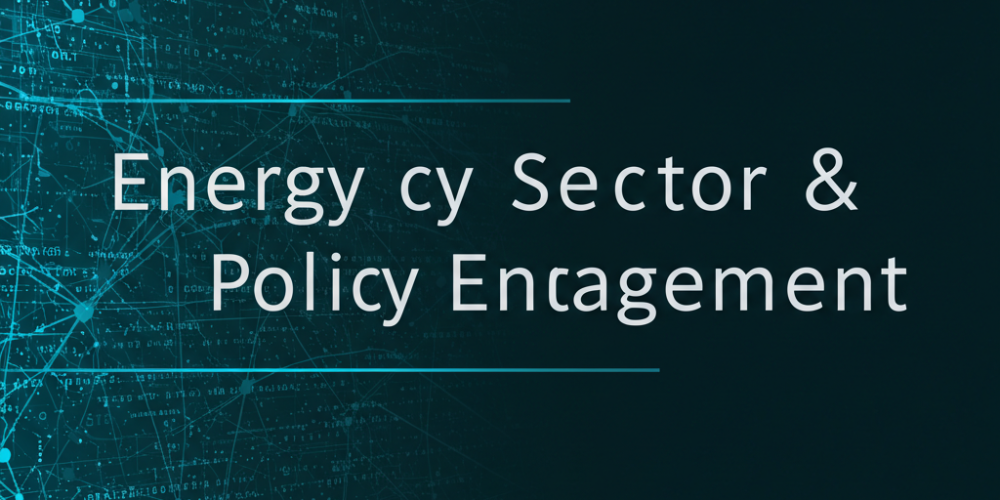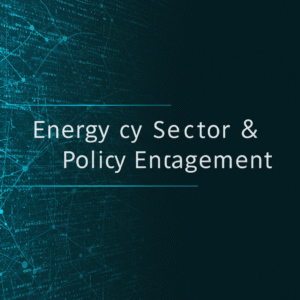Powering Progress: The Importance of Policy Engagement in the Energy Sector
The energy sector is the lifeblood of modern society, fueling our economies, powering our homes, and driving innovation. However, it’s also a sector undergoing a profound transformation, grappling with the urgent need for sustainability, security, and affordability. Navigating this complex landscape requires more than just technological advancements; it demands robust policy engagement.
Policy engagement in the energy sector refers to the active and meaningful interaction between energy stakeholders and policymakers throughout the policy lifecycle. This includes governments, industry players (from fossil fuels to renewables), consumers, researchers, NGOs, and local communities. Effective engagement ensures that energy policies are well-informed, balanced, and ultimately contribute to a sustainable and prosperous energy future.
Why is Policy Engagement Crucial in the Energy Sector?
- Informed Decision-Making: The energy sector is characterized by intricate technical, economic, and social considerations. Engaging with diverse stakeholders brings a wealth of knowledge and perspectives to the policy development process. For instance, industry experts can provide insights into the feasibility and cost-effectiveness of different technologies, while community groups can highlight potential social and environmental impacts.
- Building Trust and Legitimacy: When stakeholders are involved in shaping energy policies, they are more likely to support and comply with them. Transparent and inclusive engagement fosters trust between the government, the industry, and the public, leading to greater policy legitimacy and smoother implementation.
- Addressing Complex Challenges: The energy transition involves tackling multifaceted challenges like climate change, energy security, grid modernization, and energy access. Collaborative policy engagement allows for a more holistic approach, considering the interconnectedness of these issues and developing integrated solutions.
- Attracting Investment and Innovation: Clear, consistent, and well-supported energy policies create a stable and predictable investment environment. Engaging with investors and innovators helps policymakers understand the incentives needed to drive clean energy deployment, technological advancements, and infrastructure development.
- Ensuring Social Equity and Just Transition: Energy policies can have significant social and economic consequences for different communities. Effective engagement ensures that the needs and concerns of all stakeholders, including vulnerable populations and workers in transitioning industries, are considered, leading to a fairer and more just energy transition.
- Mitigating Risks and Conflicts: Early and continuous engagement can help identify potential risks and conflicts associated with energy projects and policies. By addressing concerns proactively, policymakers can minimize opposition, avoid costly delays, and build stronger community support.
Key Elements of Effective Policy Engagement in the Energy Sector:
- Early and Continuous Dialogue: Engaging stakeholders from the initial stages of policy formulation and maintaining ongoing communication throughout the implementation and evaluation phases is crucial.
- Transparency and Openness: Sharing information about policy goals, processes, and potential impacts openly and proactively builds trust and facilitates meaningful participation.
- Inclusive Participation: Ensuring that all relevant stakeholder groups, including those with diverse perspectives and interests, have the opportunity to contribute to the policy process.
- Active Listening and Feedback Mechanisms: Establishing channels for stakeholders to voice their opinions, provide feedback, and have their concerns addressed seriously.
- Collaboration and Partnership: Fostering collaborative relationships between government, industry, research institutions, civil society, and communities to work together towards shared energy goals.
- Capacity Building: Providing stakeholders with the necessary information and resources to participate effectively in policy discussions.
Industry Perspectives on Policy Engagement:
Different actors in the energy sector view and approach policy engagement with their unique perspectives and priorities:
- Renewable Energy Industry: Often actively engages to advocate for supportive policies like feed-in tariffs, tax credits, and renewable portfolio standards that can accelerate the deployment of clean energy technologies.
- Fossil Fuel Industry: Engages to ensure their role in the energy mix is recognized, often focusing on issues like carbon capture and storage, and advocating for policies that support existing infrastructure during the transition.
- Energy Consumers: Seek policies that ensure affordable, reliable, and clean energy access. Consumer groups often advocate for energy efficiency programs and consumer protection measures.
- Technology Providers: Engage to promote policies that support research and development, commercialization, and deployment of innovative energy technologies.
- Environmental Organizations: Advocate for ambitious policies that drive decarbonization, protect ecosystems, and mitigate the environmental impacts of energy production and consumption.
- Local Communities: Engage to ensure that energy projects are developed responsibly, considering local environmental concerns, social impacts, and economic benefits.
Navigating the Future through Collaboration:
The energy sector’s future hinges on effective policy engagement. As the world transitions towards cleaner and more sustainable energy systems, fostering open dialogue, building trust, and collaborating across different stakeholder groups will be essential. By embracing inclusive and transparent policy engagement, governments can create the enabling environment needed to power progress, achieve climate goals, and ensure a secure and equitable energy future for all. In a dynamic landscape, the art of influence in the energy sector lies not just in technological innovation, but in the power of collective participation in shaping the policies that guide our energy future.









